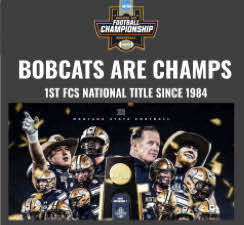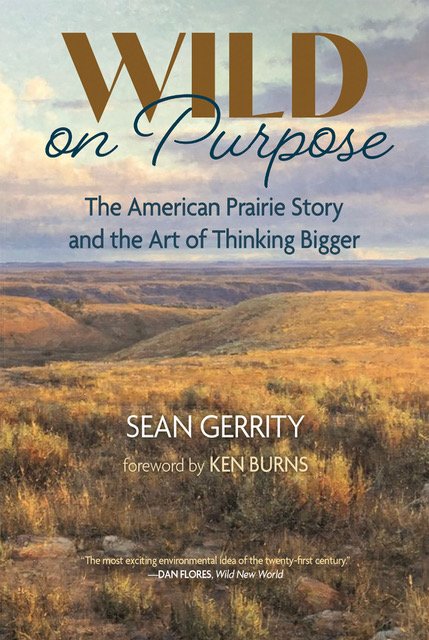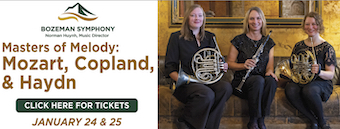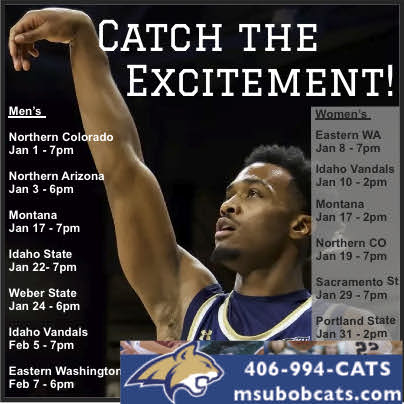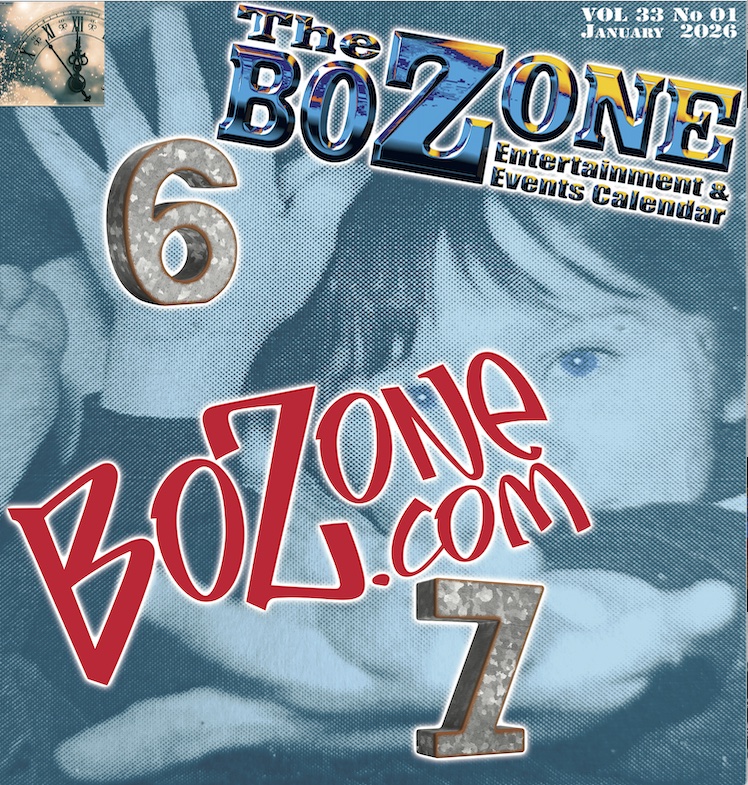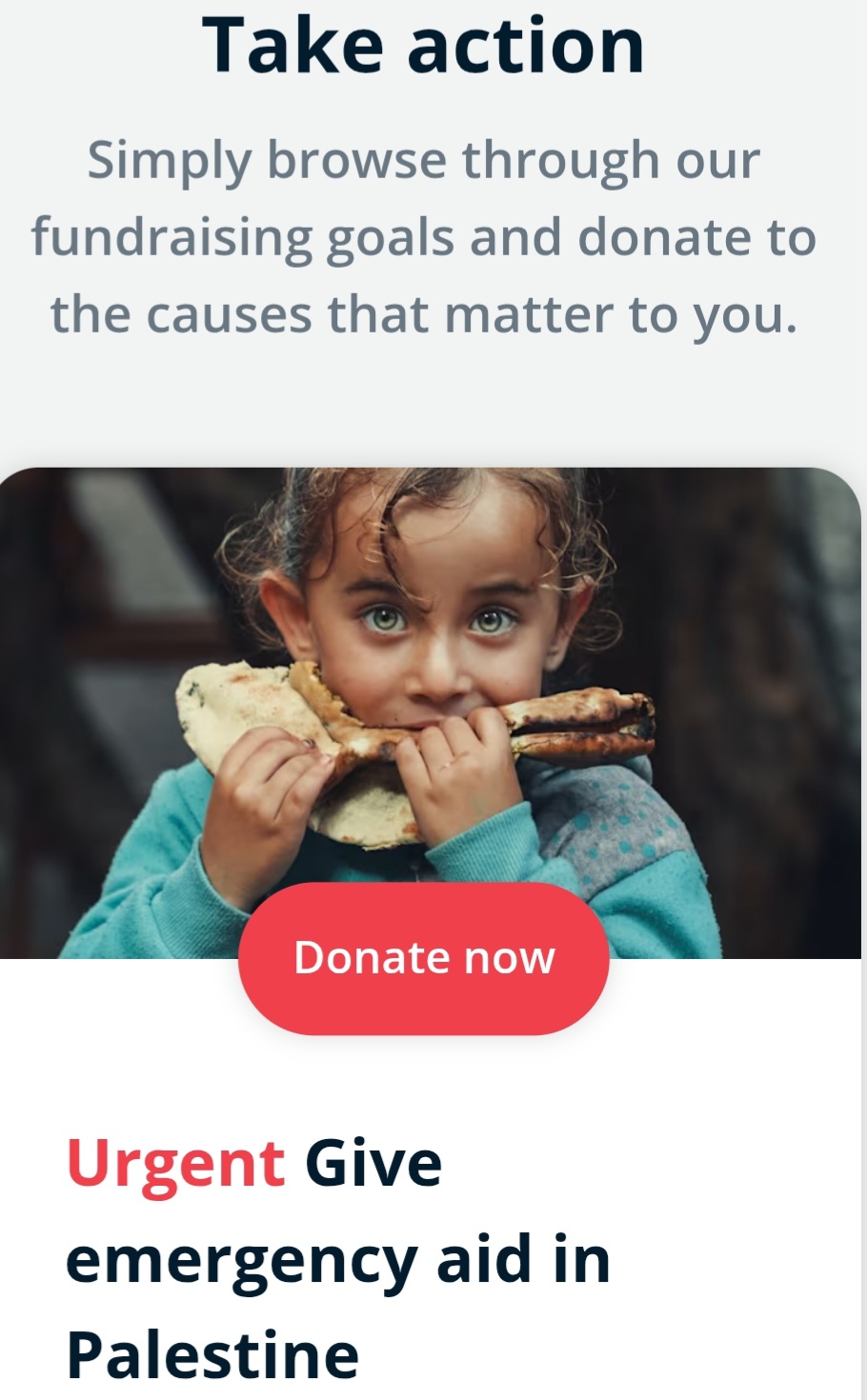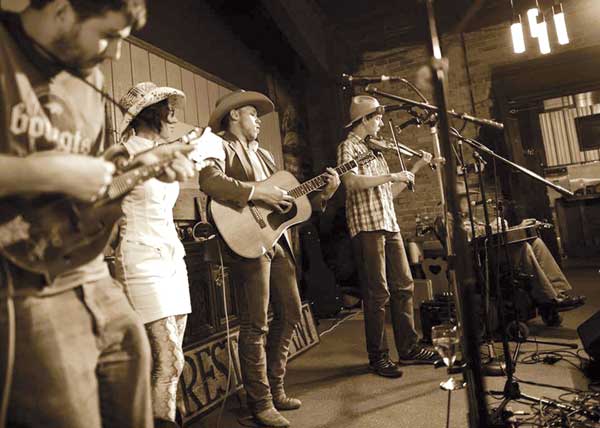 The Dirt Farmers are a foot-stomping string band out of Bozeman, who call their musical style “paisley grass.” They have gained a following for their fun-loving mix of old school country, bluegrass, blues and rock, with the occasional and welcome slip into hip-hop. The band members–as unique as their song list–serve it all up with a smile on mandolin, banjo, guitar, fiddle and bass with vocal harmonies.
The Dirt Farmers are a foot-stomping string band out of Bozeman, who call their musical style “paisley grass.” They have gained a following for their fun-loving mix of old school country, bluegrass, blues and rock, with the occasional and welcome slip into hip-hop. The band members–as unique as their song list–serve it all up with a smile on mandolin, banjo, guitar, fiddle and bass with vocal harmonies.
Stand-out guitarist/singer Kelly Hagerman fronts the band with Nate Fortier on mandolin, Bill Devine on dobro, Hans Swenson on fiddle, Shawna Lockhart on upright bass and Catey Lockhart on vocals. Dirt Farmers Nate and Kelly write original tunes that invite you to start “Having a Good Time” and experience the flavor and fun of Montana life. The Rolling Zone got a chance to sit down with Bill, Kelly, Catey, and Shawna and talk tunes after a very busy summer of music.
RZ: The Dirt Famers are relatively new to the scene, though each of you have been involved with music for much longer. Tell me about how you started this thing? CL: I think we actually started playing in 2012. SL: We’ve been together for just about three years now, because Kelly was seventeen when we started playing. Now Hans is seventeen–soon to be eighteen, so the bars won’t have to give us a hard time much longer. [laughs]
RZ: The band really is a mixed bag. How did you all meet? SL: We sort of know each other from the bluegrass jamming kind of circles–that’s where I met Nate. Then Nate and I were like, “hey let’s start a bluegrass band,” and then we both met Kelly and got him to play guitar. Paul was one of our original members, but he left to work on an independent CD project he just finished. Then Bill and I knew each other from another kind of jamming circle and band, so we persuaded Bill. Our original fiddle player Amy had a new baby, so we now have roped Hans Swenson into playing fiddle with us. We just kind of started from our mutual interest in music.
RZ: You mainly stick to bluegrass, country, acoustic americana? SL: Yeah with the occasional hip-hop tune in there.
RZ: Every now and then you throw something in there? SL: It’s interesting because, Kelly, for someone who is only twenty, seems to know these songs from like 1890, 1940. We’re always like “Kelly, were you born with two thousand songs in a databank?”
RZ: Just born with that love of music, I would imagine. KH: I mean, I wasn’t quite interested in music until I was fourteen or fifteen or so. Then I started picking up the guitar–that was when I really started getting interested in music. Mom tried to teach me piano and it would not go in, when I was about six or so. I could not absorb any of it. It took me a while to actually develop an interest in music. About six months into learning how to play guitar, I just started playing a lot of the bluegrass jams. That’s how I met Nate and Shawna.
RZ: Did you attend these bluegrass jams all in the Bozeman area or have you been all over the place? CL: There’s one at 317 on Tuesdays. Mom (SL) kind of runs the one at the Story Mansion on Wednesdays. SL: With help, I coordinate through the City Parks, so that’s kind of new, but a lot of people get together and play there.
RZ: There seems to be quite the community around here. SL: There’s this underground of everybody who likes the music.
RZ: It’s not just in Bozeman either. It’s pretty widespread. SL: Yeah. I went to the Fiddle Jam in Livingston, and then I went to the Columbus Jam. But there’s good jams all around the state. RZ: The following seems endless. I know you’ve got some original stuff, but do you guys have any favorites you like to play? CL: I like it when we do “All Aboard.” SL: That’s a really fast, kind of train song. It features a lot of players in the band.
RZ: [To Bill] How did you get started playing your instrument? BD: Originally I was a guitar player and bass in a number of bands throughout the years. You guys don’t know, but I was even a drummer. SL: I did not know that. BD: Except not a very good one. And I also played pedal steel until I couldn’t anymore. My wife insisted I started playing the dobro, but I’ve only been playing for six or seven years. So that’s not my best instrument, but it’s the one I can play most. I got bucked off a horse and broke my neck in ’84 and was paralyzed from the neck down for a while. But I actually got well enough to start slowly coming back, with the help of my power chair from the VA. I’m kind of a burden, but [the band] does a lot of stuff for me. I don’t think I tell you guys enough how much I appreciate you. It does keep me young and from becoming too crotchety. CL: Getting your guitar and plugging it in is hardly– SL: Right, it’s like Bill’s no burden. [Playing with us] certainly raises his exposure to hip-hop music. BD: But enough about me. He (pointing at Kelly) does a great Dwight Yoakam.
RZ: Oh yeah? SL: Kelly jams to old western “players of the past,” like Jimmy Rodgers, too. But I also like when we play things that are not common, like “Hip (Eponymous) Poor Boy.” That’s a Jack White song. It’s just not something every bluegrass band plays.
RZ: It’s not what people would expect. It probably adds a cool dimension, I would think. KH: Well, Louis Armstrong said, “If you can tap your foot to it, it’s good music.” We just play whatever we like. We usually stick to the older bluegrass and country, but if there’s a newer song we listen to and we like it, we do it. We converted La Roux’s “Bulletproof” into hardcore bluegrass. I like the chord progression. The song’s alright overall, but it’s british electropop. So I took the chords, changed the rhythm and tempo, converted it into hardcore bluegrass, and that’s one of the songs we play now. SL: And then originals. Nate and Kelly write quite a few tunes and are always working on those. I really love Nate’s new tune “Take the Wheel and Steer.” I sing that one around the house. If I feel like it’s catchy enough, it sticks in my head.
RZ: You play a number of venues throughout the area like Desert Rose and the Sacajawea, and also private events and weddings. Are those random or how do you choose? CL: We do shows and private parties pretty much every week. Ma does all the bookings for us, so anything that really catches her fancy, she’s really into doing. Her great dream is to play bunkhouse bass at a ranch. SL: So, yes, if we get offered a gig at a ranch, I’m like “Kelly, Kelly, please be available so we can play this,” because it’s what I want to do. We played at Montana Music Ranch on Saturday, and we’ve played up in Polson at the resort, and Great Falls, so we play all around.
RZ: Do you guys like being on the road and playing out of town? KH: A little bit, but we’re not quite to the point where we’re a touring band. We still keep Bozeman as a home base. CL: Just a couple weeks ago at the Manhattan Potato Festival, we had four gigs in three days.
RZ: Oh geez. Power through. SL: A few of those were between gigs we had already books, but I was like “I totally want to, so nobody gets any sleep, but I want to play.” It was fun.
RZ: Ok, switching gears. Tell me about the origins of your name. Why do you call yourselves the “Dirt Farmers?” SL: It’s from Levon Helm’s “Dirt Farmer.” Paul heard that and thought that it would be a good band name. He didn’t stay in the band very long, but we said “hey, we’re keeping the name.” I think it really speaks to our sound a little bit. It’s a little on the gritty and sort of a family thing. We have all ages from seventeen on up to I think Bill’s our oldest band member, not revealing his age. BD: I’m seventy-four. I have nothing to hide. SL: That gives us a pretty good spread in age range, and that’s one of the things about the band that I like. Some of the songs appeal to grandma and other songs appeal to teenagers. Little kids love us–they get up and dance right away. But some of our songs are not suitable for all ages. CL: Wait until there are no kids about, then we whip out the Snoop. SL: We definitely have some voting of what songs we’re going to play.
RZ: I bet. With the amount of people in the group and such an active schedule, how do you find the time to practice and work on your songs and performances? KH: It depends. There are times where we have a show then another shortly after that. We ask ourselves, “do we really want to practice that?” after just playing it and feel like we’re up to pace with all of our songs and won’t have the time to throw in anything new. Sometimes we don’t practice a whole lot because of how much we’re playing, but usually we practice every Monday in the evening.
RZ: Keep it fresh, all the time. SL: Oh yeah, and we’re always working on new material. Our biggest problem with our setlist isn’t getting enough on it, but whittling it down and picking our favorites. Turns out, they’re all our favorites. We have more than a hundred songs we like to play. KH: Sometimes we play “Golden Rocket” and do a tempo shift into “Play that Funky Music,” one of our patented Dirt Farmers melodies.
RZ: You just kind of read the crowd a little bit, and decide from there? CL: Yes, there’s some songs like “Venus” that will get every woman in the bar on the dance floor immediately. SL: But we alternate what we play depending on the crowd, and that gives us time for some other ones as well. But we don’t always get to the songs we want to by the end of the evening. KH: Also, selecting material depends on how we’re playing, how long we’re playing, and who we’re playing for. We do read the crowd as we go, and that makes us better as a band. SL: Often our set list is more of a suggested menu. It just gives us something to go off of. And we’re known for playing for three hours or more without no breaks, because if we’re having fun we don’t really feel like quitting.
RZ: Stopping mid-performance seems like it also kills the mood of the room. CL: That’s the thing. It also changes the energy for us as well because we’ve gone and done something else.
RZ: Takes you out of the immediate moment. KH: The mood shift really brings on a mental separation. It’s just easier to keep [the momentum] going.
RZ: Do you have any plans to release any more original material between upcoming gigs? SL: We’d like to record some of our new songs band members have written, but we just had our CD come out this spring and I don’t know if we have any energy to do another one for a while. But I think Kelly has written some new songs that I think we’re going to start practicing and playing out. CL: And Nate has some new songs that aren’t on the album. SL: We work on them for a while, then drop them for a bit and we’ll eventually pick those up and polish them up. We’re also planning on learning some traditional waltzes.
RZ: Perfect. Something for everyone to look forward to. Thanks for meeting with me today. SL: We’re excited for people to be interested in our band. We’re slowly growing & starting to get recognized. BD: I’m finding it’s hard to remain anonymous with my chair. KH: Might as well just embrace it. SL: The momentum is really picking up for the band. We’re excited. •

